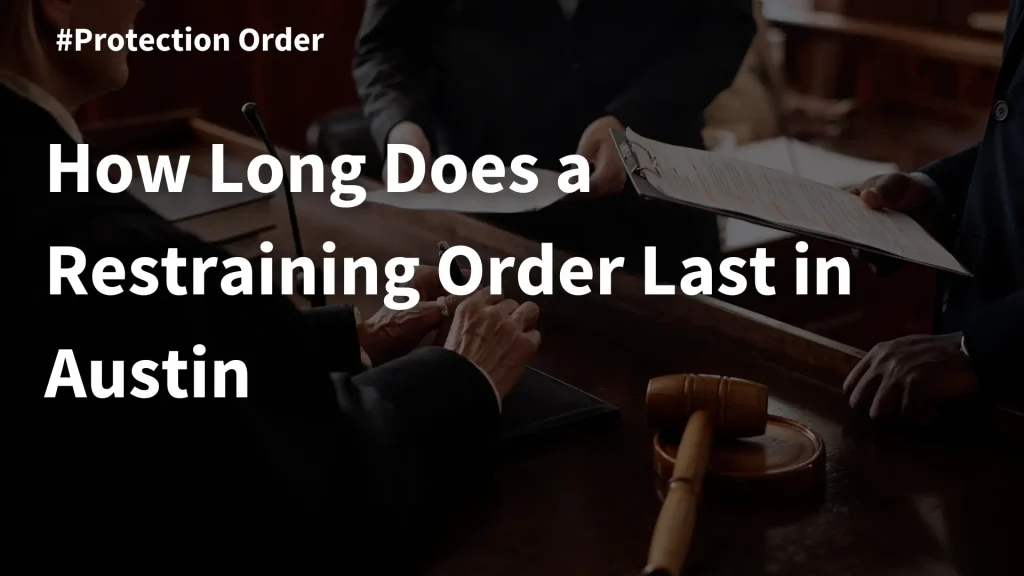Family law issues can be overwhelming, especially when they involve situations that require immediate legal protection. One of the most common legal tools used to protect individuals from harm in these situations is a restraining order.
If you’re facing such a scenario in Austin, Texas, you might wonder, “How long does a restraining order last?” Different types and durations of restraining orders are available. Knowing which ones are best in your situation is important for keeping your loved ones safe.
Types of Restraining Orders in Texas
In Texas, restraining orders are legal orders issued by a court. These orders protect individuals from harm, typically in situations involving family violence, stalking, sexual assault, or harassment. There are three main types of restraining orders available in Texas:
- Temporary Ex Parte Orders
- Permanent Protective Orders
- Magistrate’s Orders for Emergency Protection
Each of these orders serves a different purpose and has a distinct duration.
Temporary Ex Parte Orders
A temporary ex parte order is a short-term type of protective order issued without the presence of the person who is being restrained (the respondent). This type of order is often used when there is an immediate and clear threat of harm. To obtain a temporary ex parte order, the applicant must convince the judge that there is a clear and present danger of family violence, sexual assault, or other harm.
Duration: A temporary ex parte order typically lasts up to 20 days. However, the court may extend this period for additional 20-day increments if necessary, particularly if the respondent has not been served with the order yet. This extension can continue until the court holds a hearing to determine whether to issue a longer-lasting protective order.
Permanent Protective Orders
A court can issue a permanent protective order (often referred to as a final protective order) after a court hearing where both the petitioner and the respondent have the opportunity to present their cases. This type of order provides long-term protection to the petitioner. It is typically issued when there is sufficient evidence that family violence or other harmful behavior has occurred or is likely to occur.
Duration: In Texas, a permanent protective order generally lasts up to two years. However, there are certain circumstances under which the court may issue an order for a longer duration:
- If the respondent committed an act that constitutes a felony involving family violence, even if they were not charged or convicted.
- If the respondent caused serious bodily injury to the petitioner or a family member.
- If the respondent has been the subject of two or more protective orders involving the same petitioner in the past.
If the order contains no expiration date, the protective order automatically expires on the second anniversary of its issue date. Additionally, after one year, the respondent can request a hearing to ask the court to terminate the order if they believe it is no longer necessary. However, the judge will consider the continued need for protection before making a decision.
Magistrate’s Orders for Emergency Protection
A criminal court issues a magistrate’s order for emergency protection (often called an emergency protective order) after the respondent’s arrest for committing an act of family violence, sexual assault, or other related crimes. The court issues this type of order when the respondent poses an immediate threat to the petitioner.
Duration: The duration of a magistrate’s order for emergency protection can vary depending on the circumstances of the case:
- If the arrest involved family violence and the respondent used or displayed a deadly weapon, the order can last between 61 and 91 days.
- In other cases, the order typically lasts between 31 and 61 days.
A criminal court automatically issues a magistrate’s order for emergency protection under certain circumstances, such as those involving a deadly weapon, and does not require the petitioner to be present in court.
Extending or Modifying a Restraining Order
In some cases, extending or modifying a restraining order may be necessary to provide continued protection. The court can extend both temporary and permanent protective orders if it finds that the threat of harm still exists. To request an extension, the petitioner must file a motion with the court before the existing order expires. The court will then schedule a hearing to determine whether the situation warrants an extension.
If a protective order nears its expiration and the threat of harm persists, it is crucial to take action promptly. Waiting until the last minute could result in a lapse in protection, putting you or your loved ones at risk.
What Happens If a Violation of the Order Occurs?
Violating a restraining order is a serious offense in Texas and can result in criminal charges. If the respondent violates the terms of the order, the petitioner should contact law enforcement immediately. The police can arrest the respondent for violating the order, leading to criminal penalties, including jail time and fines.
Additionally, the petitioner can use the violation of a protective order as evidence in court if they seek to extend the order or obtain additional protective measures. The court takes protective order violations very seriously, and repeated violations result in more severe consequences for the respondent.
Seeking Legal Assistance

Smith & Bledsoe Family Law in Austin, Texas, provides compassionate and effective legal representation to individuals seeking protection through restraining orders. Our award-winning team understands the emotional toll that these situations can take and is committed to helping you feel confident about your case.
Contact an Austin Family Law Attorney
Understanding how long a restraining order lasts and the different types available in Texas is essential for ensuring your safety and the safety of your loved ones. Whether you need immediate protection through a temporary ex parte order or long-term security with a permanent protective order, the Austin protective order lawyers of Smith & Bledsoe Family Law are here to help.
Call our law firm today at (512) 277-3166 or contact us online to learn more about your options and how we can assist you in securing the legal protection you need. Remember, you don’t have to experience this difficult time alone — our team is here to support you every step of the way. Check out the legal team and our success stories to gain the confidence to trust us with your case.
Related Posts:
Can You Appeal a Divorce in Texas?
Protection Order vs. No Contact Order: What’s the Difference?
